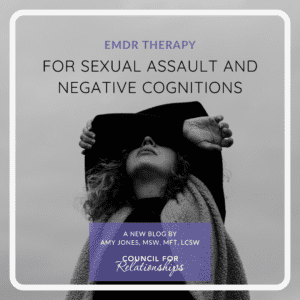EMDR Therapy for Sexual Assault and Negative Cognitions
Sexual assault is a deeply traumatic experience that can leave lasting emotional and psychological scars. Survivors often carry invisible wounds that affect their daily lives, relationships, and sense of safety. While every survivor’s journey is unique, many grapple with mental health challenges in the aftermath of trauma—challenges that can feel overwhelming and isolating. Fortunately, healing is possible. One evidence-based approach, EMDR therapy (Eye Movement Desensitization and Reprocessing), offers hope and support in navigating the path to recovery—especially for survivors carrying negative cognitions tied to shame, fear, or self-blame.
Trigger Warning: This blog discusses sexual assault and its psychological impacts. Please take care while reading.
The Mental Health Impact of Sexual Assault
Each April, Sexual Assault Awareness Month reminds us of the urgent need to prevent sexual violence and support survivors in their healing journeys. The National Sexual Violence Resource Center leads this nationwide campaign, which officially began in 2001. Decades earlier, activists and advocates laid the groundwork through tireless work.
On a local level, organizations like WOAR Philadelphia Center Against Sexual Violence provide critical services, including counseling, education, and advocacy for survivors. For over 50 years, WOAR has worked to eliminate sexual violence through healing-centered support and prevention.
PTSD, Anxiety, and Depression After Sexual Assault
The effects of sexual assault extend far beyond the moment of harm. Survivors may experience a wide range of psychological symptoms, including:
- Post-Traumatic Stress Disorder (PTSD): Flashbacks, nightmares, hypervigilance, and emotional numbness.
- Anxiety and Panic Attacks: Persistent fear, restlessness, and worry that can interfere with daily life.
- Depression: Feelings of sadness, disconnection, shame, and hopelessness.
- Dissociation: Feeling disconnected from one’s body, emotions, or surroundings.
- Self-blame and Low Self-Esteem: Survivors often struggle with misplaced guilt and internalized blame.
- Relationship Challenges: Trust, intimacy, and vulnerability may feel unsafe or out of reach.
These symptoms not only impact mental health—they often ripple outward into every aspect of a survivor’s life, from school and work to physical health and personal identity. Therapeutic approaches like EMDR therapy can reduce these symptoms by targeting the root memories and beliefs driving them.
How Trauma Affects the Brain and Leads to Negative Cognitions
To understand why these symptoms appear—and why they persist—it helps to look at how trauma affects the brain.
When someone experiences trauma, the brain doesn’t store that event like a normal memory. Trauma often fragments the memory and leaves it “stuck,” charged with overwhelming emotions, physical sensations, and negative beliefs about the self—what EMDR therapists call negative cognitions.
Some common negative cognitions that sexual assault survivors carry include:
- “It was my fault.”
- “I’m not safe.”
- “I’m powerless.”
- “I can’t trust anyone.”
- “I’m broken.”
- “I don’t matter.”
- “I should have done something.”
- “I’m worthless.”
These beliefs don’t reflect the truth—but survivors often feel them in their bodies when they haven’t processed the trauma.
When Survivors Are Dismissed: The Impact on Mental Health
Unfortunately, the trauma doesn’t always end with the event itself. Survivors often face additional harm when others fail to believe or support them.
Sadly, many survivors experience a second layer of trauma when others meet their requests for help with disbelief or blame. This social response—known as institutional betrayal or secondary victimization—can worsen mental health outcomes and make survivors less likely to seek further help. This response reinforces feelings of shame, powerlessness, and self-doubt. These experiences often intensify the survivor’s negative cognitions, making them feel even more disconnected from their sense of self.
Survivors are often told:
- “It’s been too long.”
- “Why didn’t you say something sooner?”
- “Were you drinking?”
- “You must have misunderstood.”
How EMDR Therapy Supports Healing from Sexual Assault
Many survivors feel overwhelmed by trauma that seems stuck in the body and mind. This section explains how EMDR therapy offers a structured, compassionate way to process painful memories, reduce distress, and replace negative cognitions with empowering beliefs.
How EMDR Therapy Works
One powerful treatment option for trauma survivors is EMDR therapy. Developed by psychologist Dr. Francine Shapiro, EMDR offers a structured, evidence-based approach that helps individuals process distressing memories and reduce their emotional intensity. During EMDR, a trained therapist guides clients through bilateral stimulation—often through guided eye movements, the Butterfly Hug, taps, or tones—while the client focuses on a traumatic memory. Through this process, the brain reprocesses stuck or unintegrated experiences, reducing emotional overwhelm and enabling new, more adaptive beliefs to take root.
Why EMDR Therapy Can Help Process Negative Cognitions
EMDR does not require a detailed retelling of the traumatic event, which can be especially supportive for those who find verbal recounting retraumatizing. It specifically targets the negative beliefs that survivors often internalize, like “I’m broken” or “It was my fault.” Through processing, survivors can replace these with more adaptive, life-affirming beliefs, such as:
- “I am strong.”
- “I am in control now.”
- “I did the best I could.”
- “It wasn’t my fault.”
- “I am safe now.”
- “I am lovable.”
- “I matter.”
- “I can protect myself.”
- “I can trust myself to heal.”
New, Empowering Beliefs That Can Take Root Through EMDR Therapy
As trauma is processed through EMDR therapy, survivors often notice meaningful shifts in the way they view themselves and their experiences. This section highlights examples of how negative cognitions can transform into more empowering, healing beliefs.
| Negative Cognition | Positive Cognition |
|---|---|
| "I am powerless." | "I am in control now." |
| "I should have done something." | "I did the best I could." |
| "I’m not safe." | "I am safe now." |
| "It was my fault." | "I am not to blame." |
| "I’m broken." | "I am whole." |
| "I don’t matter." | "I matter." / "I am valuable." |
| "I can’t trust myself." | "I can trust myself to heal." |
| "I’m unlovable." | "I am lovable." |
| "I can’t trust anyone." | "I can choose who to trust." |
Clients often discover these belief shifts organically during EMDR reprocessing, as the brain begins to integrate what happened with new, adaptive insights. They help survivors move from survival mode into a space of resilience and reconnection. Replacing entrenched negative cognitions with adaptive beliefs is a key part of this transformation. In fact, addressing these negative cognitions is central to the healing process supported by EMDR therapy.
Reclaiming Connection: You Are Not Alone in Your Healing
Survivors of sexual violence often carry their trauma in silence, unsure of where to turn or how to begin the healing process. But there is support, and there is hope. EMDR therapy is one of many pathways that can help survivors reclaim their sense of self, safety, and connection. By reducing the intensity of traumatic memories, EMDR therapy supports deep, lasting healing—especially when guided by a trauma-informed clinician.
Through this work, survivors can begin to challenge and change the negative cognitions that may have shaped their view of themselves and the world.
Editor’s Note: The views expressed in this blog are those of the author and do not necessarily reflect the official policy or position of Council for Relationships.
About Therapy & Psychiatry at Council for Relationships
At Council for Relationships, we believe healing is possible for everyone. This section shares how our expert therapists and psychiatrists can support your mental health journey, whether you’re seeking trauma-focused care, EMDR therapy, or simply someone to talk to.
About the Author
Amy Jones, MSW, MFT, LCSW, is the Director of Women’s Psychological Health Services and a Staff Therapist at Council for Relationships. She specializes in working with women experiencing the effects of trauma, anxiety, and identity transitions. Request an appointment with Amy today.
About Women’s Psychological Health Services
Women’s Psychological Health Services (WPHS) at Council for Relationships offers expert care for women navigating trauma, life transitions, motherhood, and more. Our clinicians bring empathy, specialization, and connection to every session, with extensive training in evidence-based approaches like EMDR therapy. Get matched with a WPHS therapist today.
More Mental Health Advice & Resources from Council for Relationships
Council for Relationships has over 80 expert therapists and psychiatrists ready to support you, including many trained in EMDR therapy for trauma and recovery. Get matched with a clinician who fits your needs. Stay informed with mental health tips, resources, and updates from our experts. Sign up for our newsletter. Explore more mental health insights on our CFR blog.


